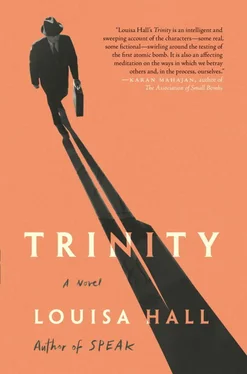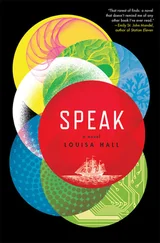They sat for a moment together, finally alone but not touching. He still wouldn’t look over his shoulder.
Then she reached out and touched the brim of his hat. Then she took it off. She held it gently in her lap, and looked down at it for a moment, and only then did he lean forward and kiss her.
I DON’T LIKE IT EITHER. I DON’T LIKE IT NOW, AND I DIDN’T LIKE ITback then: peering through the back windshield at the other side of a lie.
Some secrets aren’t meant to come out. Some, when they do, are only misleading. Sometimes an uncovered secret is worse than having no information to start with. It’s the portion of the iceberg that shows over the surface, which isn’t helpful at all, at least not for measuring the shape and mass of the iceberg.
Sometimes it only serves to point out how much you don’t know about the whole object. I didn’t know, for example, when I watched Opp and that girl through the back windshield, why Opp waited until she touched him first before he leaned forward to kiss her.
Or what she was thinking, when she put his hat in her lap. Or what she was thinking when she sat there for a moment, looking down at the hat, and he hadn’t yet kissed her.
And given those holes in the information I did have—that Opp had veered off from his preapproved plan; that he’d lied about where he was going; that he’d ended up with a girl who wasn’t his wife; that he’d gotten into her car; that he’d finally leaned forward and kissed her—given those holes, what did I know about that situation?
Some uncovered secrets only point out the need to uncover more secrets, especially when it comes to a man with a position like Opp’s. He ran off from the mesa, after all, having been granted the highest level of security clearance. And we were at war. Pearl Harbor had been attacked. Most of us believed that San Francisco or Los Angeles would be the next target.
Now the danger’s receded, so it seems prying, watching Opp and that girl through the lens of a camera. When you’re not living with an imminent threat, it’s easier to think that people should be permitted their secrets. But when Opp came back, we were on guard. We’d set aside our reservations.
That month, for example, was the same month a white mob rioted for three days in the black neighborhoods of Beaumont. But I only know that because when I came home from following Opp, I sat down for a drink at the table and saw that May had left the newspaper open. She had it turned to an article about Beaumont, buried somewhere deep in the back pages.
There was a water ring from her glass, just above the photograph. The caption mentioned that five black people were killed. Whole blocks were burned to the ground, and nobody was prosecuted.
Then, for a moment, I wondered why May wanted to read about Beaumont. I’d never even heard of the place before I found that ring on the paper.
Do you see what I’m saying? We were at war. Stories like that one got buried. That same month, in Los Angeles, a mob of servicemen on leave headed to a Hispanic neighborhood and started attacking residents. Five days later, thousands of civilians were involved in the fighting, but you didn’t read about that in the papers.
In San Francisco, when we followed Opp, everywhere you turned you saw banners: Japs Move Along, or Japs Don’t Let the Sun Set on You Here . There were foreclosure notices on every Japanese storefront, whole streets of houses abruptly abandoned, whole neighborhoods suddenly vacant except for a few Polish families wandering around like survivors.
But no one really paid much attention. We were focused on other threats. Violence on an international scale. Opp, for instance, ran off from the mesa in possession of secrets about a weapon that could evaporate a whole city. So you understand why we believed we had to collect whatever information we could.
Even if the information wasn’t complete.
Or even if it was of a personal nature. Even if it involved looking in the back window of that girl’s Plymouth coupe, and taking a photograph when he kissed her.
ONCE THE GIRL PULLED AWAY, SHE HUNCHED OVER THE WHEEL ANDfumbled with the ignition. Frank waited for the Plymouth to edge out into traffic, then let a few cars get between us.
“Unfortunately,” Frank said, “I’m starting to think she might love him.”
“Why unfortunately,” I said.
“It always ends badly for the piece if she loves him.”
We followed her up Fremont Street toward Market. When we’d pulled up at a red light, Frank checked his mirrors. Then he leaned back in the seat. He cradled his head in his hands.
“By page sixty-three,” he said, “she’s looking lovely, draped over a desk, wearing a hole in her head instead of a hat.”
That’s the kind of story Frank liked to make out of a case. It got on Pash’s nerves. Pash was a dramatic person himself, but when other people took narrative license, it rubbed him the wrong way. He liked to insist we were in the business of uncovering facts. He got livid whenever Frank started talking like a gumshoe in a pulp. At first, he’d try to pretend he couldn’t hear what Frank was saying, but his face picked up that angry, rabbity look. His eyes started to bulge, and his mouth worked under his moustache. Eventually he’d start to issue directives.
“We’re not here to tell stories,” he’d say. Or: “We’re here to notice the events as they happen.”
But Frank couldn’t be stopped. We were still waiting at the red light, and he was still leaning back in his seat.
“Or maybe,” he said, “she’s not draped over the desk. Maybe she works for the Reds, but after she lures the scientist in, she has regrets about the whole ploy. As it turns out, she really loves him. She loves him despite the fact that he’s married. So later, after she helps the Reds procure their dirty photographs, she tries to get the photographs back. She goes to great lengths. She seduces her handler, even though he’s a scumbag. The scumbag lets her think he’s keeping the photographs in his desk. But after she’s already seduced him, she goes through his desk and realizes they’re gone. He’s already sent the prints back to Moscow.”
“He’s a Russian?” I said, keeping my eyes on the light.
“No,” Frank said. “He’s one of these American Reds the Russkis keep in their pocket. So now cut to the morning, and she’s in her car, and she’s slept with this scumbag handler. Let’s say he’s not just a scumbag. He’s also obese. He has greasy hair and bad teeth. And now the scientist’s already back on the mesa, where he lives with his wife. Let’s make the wife pretty. With two sweet little kids. So then the piece is in front of her handler’s house, alone in her car, and she’s in love with the scientist even though she betrayed him. And now it’s too late. And she’s sitting alone. And it’s very depressing. So instead of driving back to her apartment she drives to some lonely cliff over the ocean.”
“The light turned,” I said.
Frank pulled into traffic, weaving between a few cars because the girl had gotten too far ahead. “So she drives to some lonely cliff,” he said, shifting into second gear, “and she parks there. And she shoots herself in the mouth with a pistol.”
We were both quiet for a minute. Frank had gotten up close to the Plymouth.
“Why doesn’t she just drive off the cliff?” I said.
“Why would she drive off the cliff?” Frank said. He sounded annoyed with the question.
“Why would she go to a cliff if she doesn’t want to drive off it?”
“Because there’s nothing to see if the piece drives off a cliff,” Frank said. “There’s no body left to discover.”
The girl turned onto Market, and Frank held back for a minute, then turned behind her.
Читать дальше












